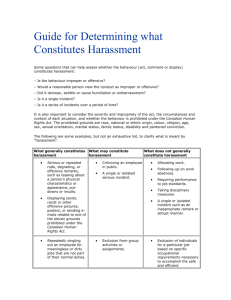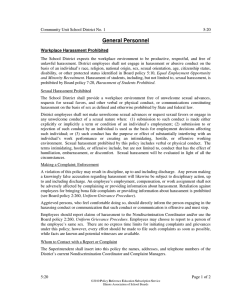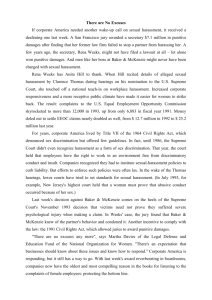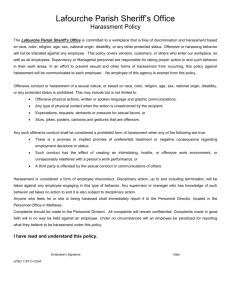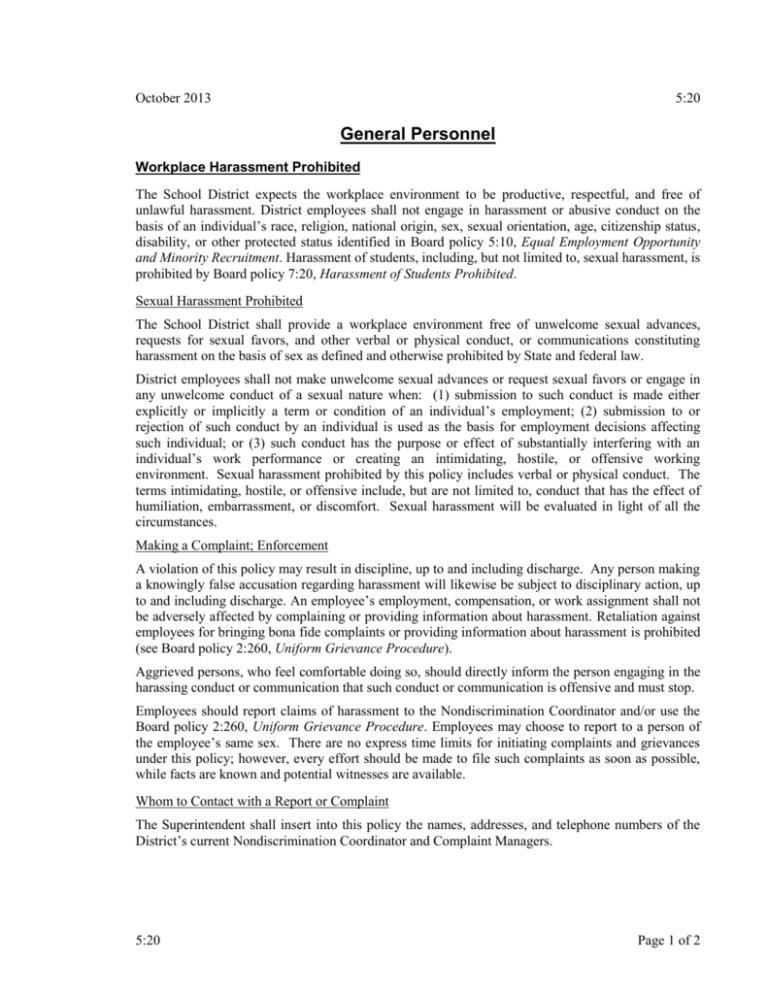
October 2013
5:20
General Personnel
Workplace Harassment Prohibited
The School District expects the workplace environment to be productive, respectful, and free of
unlawful harassment. District employees shall not engage in harassment or abusive conduct on the
basis of an individual’s race, religion, national origin, sex, sexual orientation, age, citizenship status,
disability, or other protected status identified in Board policy 5:10, Equal Employment Opportunity
and Minority Recruitment. Harassment of students, including, but not limited to, sexual harassment, is
prohibited by Board policy 7:20, Harassment of Students Prohibited.
Sexual Harassment Prohibited
The School District shall provide a workplace environment free of unwelcome sexual advances,
requests for sexual favors, and other verbal or physical conduct, or communications constituting
harassment on the basis of sex as defined and otherwise prohibited by State and federal law.
District employees shall not make unwelcome sexual advances or request sexual favors or engage in
any unwelcome conduct of a sexual nature when: (1) submission to such conduct is made either
explicitly or implicitly a term or condition of an individual’s employment; (2) submission to or
rejection of such conduct by an individual is used as the basis for employment decisions affecting
such individual; or (3) such conduct has the purpose or effect of substantially interfering with an
individual’s work performance or creating an intimidating, hostile, or offensive working
environment. Sexual harassment prohibited by this policy includes verbal or physical conduct. The
terms intimidating, hostile, or offensive include, but are not limited to, conduct that has the effect of
humiliation, embarrassment, or discomfort. Sexual harassment will be evaluated in light of all the
circumstances.
Making a Complaint; Enforcement
A violation of this policy may result in discipline, up to and including discharge. Any person making
a knowingly false accusation regarding harassment will likewise be subject to disciplinary action, up
to and including discharge. An employee’s employment, compensation, or work assignment shall not
be adversely affected by complaining or providing information about harassment. Retaliation against
employees for bringing bona fide complaints or providing information about harassment is prohibited
(see Board policy 2:260, Uniform Grievance Procedure).
Aggrieved persons, who feel comfortable doing so, should directly inform the person engaging in the
harassing conduct or communication that such conduct or communication is offensive and must stop.
Employees should report claims of harassment to the Nondiscrimination Coordinator and/or use the
Board policy 2:260, Uniform Grievance Procedure. Employees may choose to report to a person of
the employee’s same sex. There are no express time limits for initiating complaints and grievances
under this policy; however, every effort should be made to file such complaints as soon as possible,
while facts are known and potential witnesses are available.
Whom to Contact with a Report or Complaint
The Superintendent shall insert into this policy the names, addresses, and telephone numbers of the
District’s current Nondiscrimination Coordinator and Complaint Managers.
5:20
Page 1 of 2
Nondiscrimination Coordinator:
Name
Address
Telephone
Complaint Managers:
Name
Name
Address
Address
Telephone
Telephone
The Superintendent shall also use reasonable measures to inform staff members and applicants of this
policy, which shall include reprinting this policy in the appropriate handbooks.
LEGAL REF.:
Title VII of the Civil Rights Act, 42 U.S.C. §2000e et seq.; 29 C.F.R. §1604.11.
Title IX of the Education Amendments, 20 U.S.C. §1681 et seq.; 34 C.F.R. §1604.11.
Ill. Human Rights Act, 775 ILCS 5/2-101(E), 5/2-102(D), 5/5-102, and 5/5-102.2.
56 Ill. Admin.Code Parts 2500, 2510, 5210, and 5220.
Burlington Industries v. Ellerth, 118 S.Ct. 2257 (1998).
Crawford v. Metro. Gov’t of Nashville & Davidson County, 129 S. Ct. 846 (2009).
Faragher v. City of Boca Raton, 118 S.Ct. 2275 (1998).
Franklin v. Gwinnett Co. Public Schools, 112 S.Ct. 1028 (1992).
Harris v. Forklift Systems, 114 S.Ct. 367 (1993).
Jackson v. Birmingham Board of Education, 125 S.Ct. 1497 (2005).
Meritor Savings Bank v. Vinson, 106 S.Ct. 2399 (1986).
Oncale v. Sundown Offshore Services, 118 S.Ct. 998 (1998).
Porter v. Erie Foods International, Inc., 576 F.3d 629 (7th Cir. 2009).
Sangamon County Sheriff’s Dept. v. Ill. Human Rights Com’n, 908 N.E.2d 39 (Ill., 2009).
Vance v. Ball State University, 133 S. Ct. 2434 (2013).
CROSS REF.:
2:260 (Uniform Grievance Procedure), 5:10 (Equal Employment Opportunity
and Minority Recruitment), 7:20 (Harassment of Students Prohibited)
5:20
Page 2 of 2

